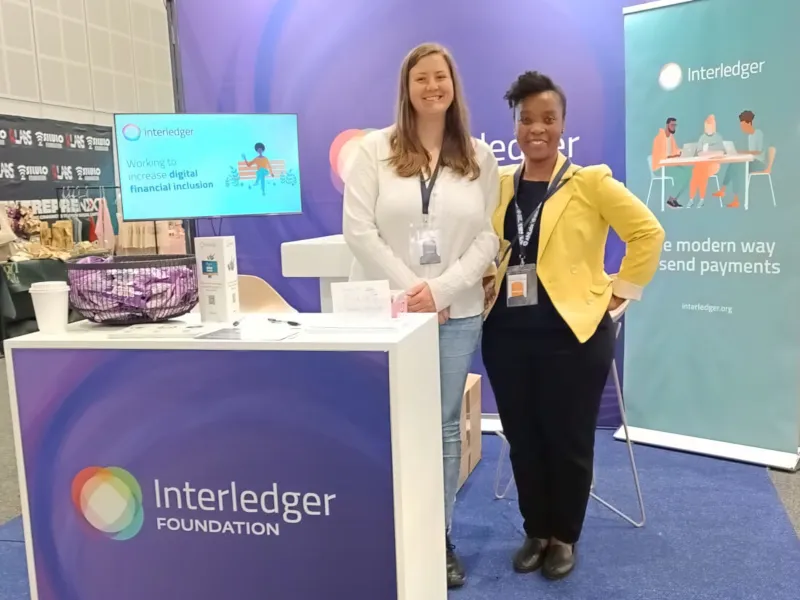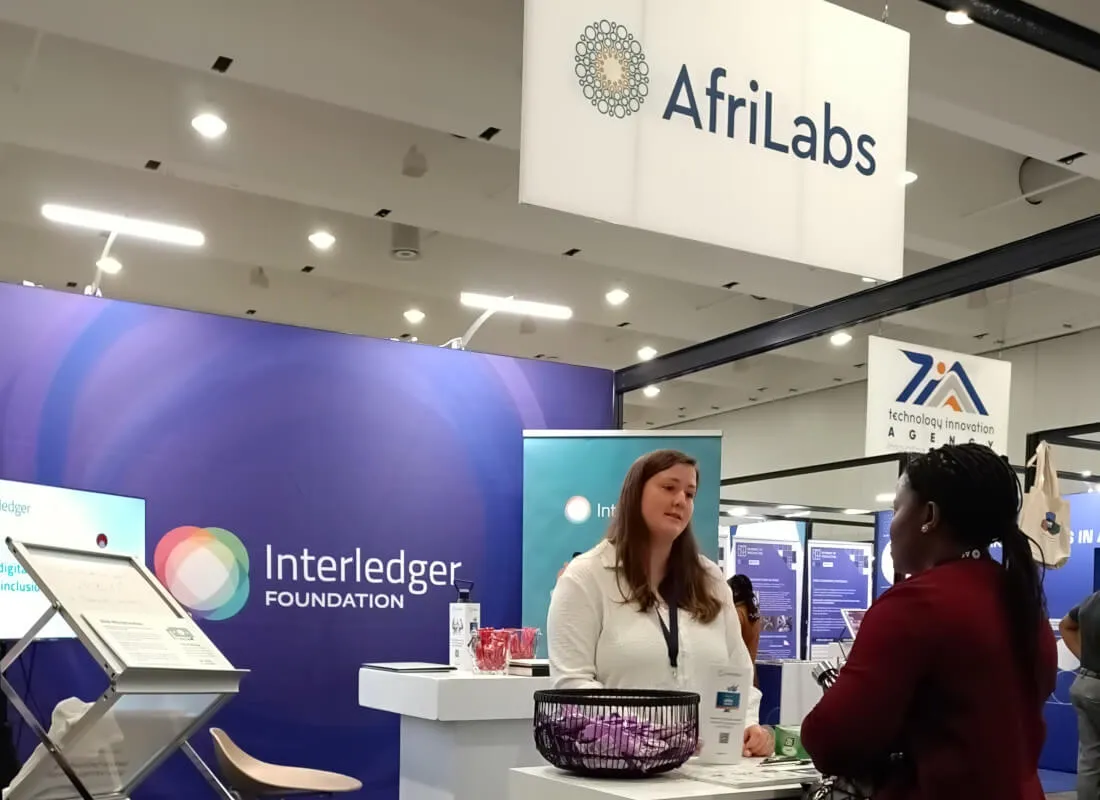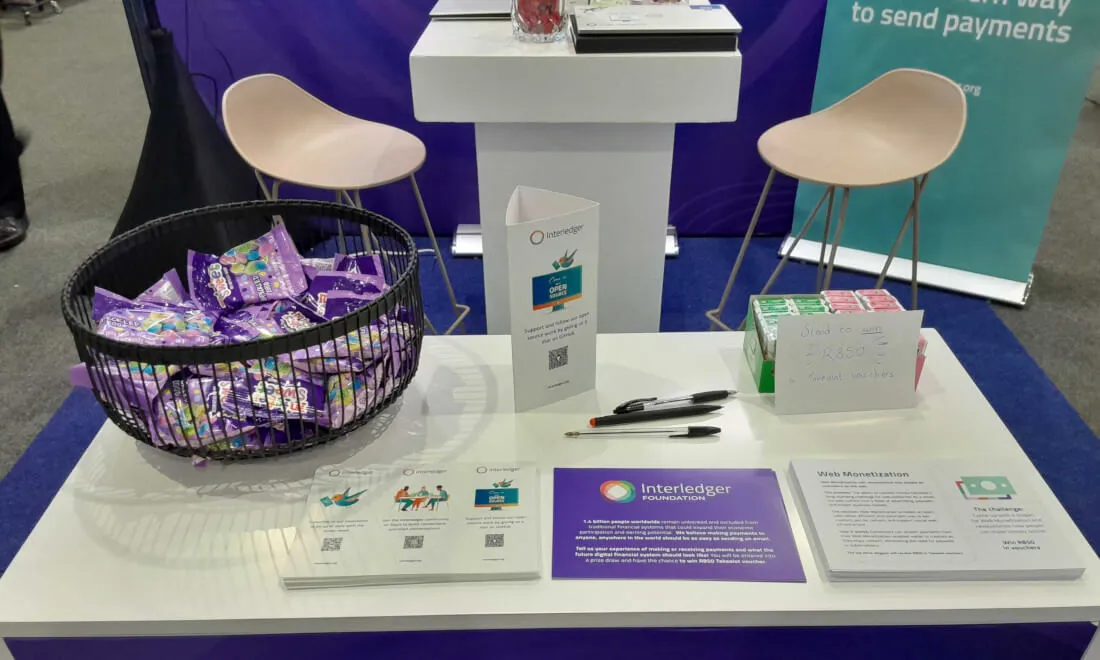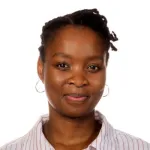
Highlights from AfriLabs 2024
Written by Sarah Jones, Tšeli ThabaneThis year, we had the privilege of exhibiting at the AfriLabs Annual Gathering (AAG) held in Cape Town, South Africa. This is what we learned:
- For digital payments systems to be truly inclusive, they must work for people from all walks of life, meeting their needs where they are.
- There is a need for digital finance tools and platforms that cater to various demographics, making it possible to transact easily across countries and currencies.
- Meaningful inclusivity will be unlocked when digital financial systems and services are accessible to anyone.
These insights helped us better understand the importance of what Interledger is working toward: enabling seamless, inclusive, and sustainable digital finance experiences for everyone, no matter where they are.
AfriLabs is a network that connects tech and innovation hubs across 53 African countries. By bringing together entrepreneurs, leaders, and creatives, it is an environment that fuels collaboration and knowledge-sharing. Its mission is to empower startups and innovation communities throughout the continent. The 2024 theme was Uniting Innovation. This resonated deeply with us because it aligns with our mission. At the Interledger Foundation (ILF), we aim to unite digital payments through open standards and revolutionize the way people transact.
Our exhibitor booth at the 2024 AAG was part of the Gender and Inclusion track. This was one of six tracks, and the others were Hub Solution; Policy, data & AI; The Green & Blue Economy; Creative Digital Economy; Investor & Investment. Over the two conference days, we had engaging conversations with attendees from diverse backgrounds, including innovation hub leaders, payments enthusiasts, entrepreneurs, interns, students, and creatives from Nigeria, Rwanda, Tanzania, Uganda, Lesotho, Zimbabwe, and Malawi, to name a few.
Conversations on Digital Finance in Africa
It was clear from our interactions that many attendees wore multiple hats — leaders of innovation hubs were often also entrepreneurs, consultants, or involved in non-profit work. This brought a unique depth to our conversations, as we discussed both the professional and personal experiences they face with payments and digital finance.

In our discussions throughout the conference, a few key points resonated most with attendees. Across the board, people immediately appreciated the value of solutions that enable interoperability between different types of accounts—like mobile wallets, digital banks, and traditional bank accounts. Cross-border payments were also top of mind for many, as people expressed the challenges of sending or receiving payments seamlessly across borders, and across currencies. This challenge was consistently noted for payments between countries within the African continent and for payments to or from countries beyond Africa.
We received consistent feedback about the need for, and value of having standards and technologies that will make cross-border transactions smoother, low-cost, and more accessible. Our Interledger analogy that sending payments should be as easy as sending an email really resonated with people. The concept of Open Payments, with its human-readable, publicly-shareable wallet addresses, sparked interest and excitement. The people we spoke to loved the idea of a wallet address that feels like an email — easy to understand, safe to share, and capable of transforming digital payments and online commerce. Likewise, developers loved the idea of securely facilitating payments directly with users’ accounts, with explicit user permission, without needing to integrate with third-party payment gateways.
Bold Slogans, Big Visions
What generated even more discussion was a competition we held, offering the chance to win a voucher. Participants could share their vision for the future of digital finance or create a slogan to inspire the future of Web Monetization. For context, Web Monetization is an open standard that enables micropayments to websites and creators directly through the browser by streaming small payments online in real-time, offering a sustainable alternative to ads and paywalls. The engagement was fantastic, and it was heartening to see people truly connecting with ILF’s mission.
Congratulations to our winning submissions:
- Turning content into currency [submitted by Mieska F. 👏 🎀]
- Support creators. Support culture and Value in every byte. [submitted by Ceinwen A. 👏 🎀]
- My experience: KYC is long, or the system used is cumbersome. This needs to be simpler & faster. The future digital financial system should: be linked to something that travels with you, like a unique ID number. It needs to be able to work across borders, for all currencies.” [submitted by B.B. 👏 🎀]
A Collective Voice
Based on the competition forms we collected, there were a few recurring themes that emerged when participants shared their vision of the future of digital payments.
- Across the board, people want payment systems to be as simple as possible. Words like easy, simple, and hassle-free were used repeatedly to describe an ideal user experience.
- Attendees highlighted that sending or receiving money often takes longer than desired, especially between different countries. They want secure and fast payments.
- People want accessible systems that are inclusive to anyone—tech-savvy or not.
Reflections on AfriLabs
Our experience with AfriLabs was a reminder that collaboration is an essential part of working towards accessibility when the goal is inclusive systems for digital finance. Meeting individuals from across the African continent who are energized about financial inclusion and digital innovation, and its intersection with many other fields was inspiring. There was a clear, shared understanding of the need for simple, efficient, and secure digital financial systems, especially as global challenges persist in cross-border payments and interoperability across payments systems. Yet an equally strong sense of optimism filled the room, with many recognizing the positive change that solutions like Interledger and Open Payments can bring.
And yes, we also learned that sweeteners like free candy and t-shirts are universally loved 🍬🍭!

Thank you to everyone who stopped by our booth. We’re excited to continue these conversations and work towards a future where anyone can access fast, low-cost digital financial systems and services easily and securely.

Sarah is a frontend developer at the Interledger Foundation, passionate about design, UX, and accessibility. She has worked on Rafiki, which packages up Interledger and Open Payments functionality, and contributed to a Web Monetization WordPress plugin.

Tšeli’s career spans software development, management, and entrepreneurship in South Africa. She has experience delivering proprietary software for banks and retailers, and now focuses on open-source solutions and standards to deliver impactful projects in different parts of the world.